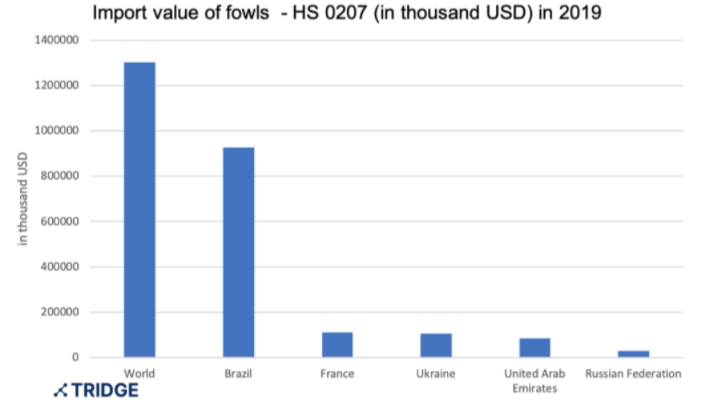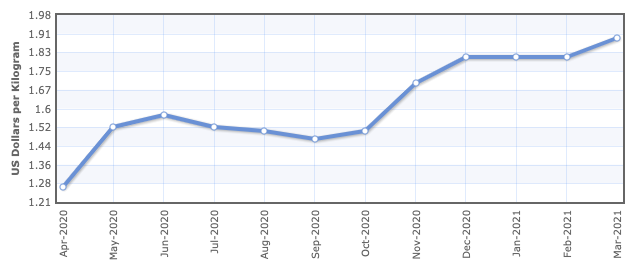Saudi Arabia suspended eleven Brazilian chicken slaughterhouses
Brazil is the world leader in exports of chicken meat and offals, representing 27% of the global market. Saudi Arabia is the second-largest importer of Brazilian chicken meat, bringing USD 787.7 million in revenues, and Brazil, the largest supplier of chicken to Saudi Arabia responsible for 72.5% of the total market share.

Source: Tridge, ITC
The chicken trade between the countries has a history of 46 years. At the beginning of 2020, 22 Brazilian slaughterhouses were licensed to export to Saudi Arabia. In February 2020, two licenses were temporarily suspended, and last Monday (May 10th), the Saudi Arabian government notified the temporary suspension of 11 slaughterhouses from May 23rd. The announced reason for the suspension is the non-compliance with the microbial levels stipulated in the technical norm GSO 1016/2015. The Brazilian government has been requesting evidence since there is no mention of the methodology used for the analysis, lot numbers, and results were attached to corroborate the claim. Both countries are members of the World Trade Organization (WTO), and as members, they are not allowed to impose sanitary barriers without technical backup.
Around the same time, the Saudi Food and Drugs Authority (SFDA) has shortened the shelf life of frozen chicken from 12 months to 3 months, going against normal international practices and complicating the chicken export to Saudi Arabia from all producing countries. Producers felt that these two announcements could be characterized as unilateral protective measures. The Brazilian government is still waiting for a response from the Saudi Arabian government, and if they are not in line with international practices, the International Chamber of Commerce will start to analyze the suspension.
Consequences of the suspensions
The direct consequence of the suspension is the decrease of nearly 780 thousand MT of chicken export volume to Saudi Arabia on yearly basis. The affected companies will have to find new markets for the volumes that were initially intended for Saudi Arabia possibly targeting Muslim buyers since their facilities were all modified to comply with Halal requirements.
The sudden availability of chicken in the market from May 23rd would decrease domestic and international prices for a short period for Brazilian chicken. But the elevated demand for animal protein globally is likely to absorb the surplus. According to the Brazilian Institute for Applied Economic Research (IPEA), animal protein exports grew 10% in 2020 with the main increase from China.
The reduced chicken supply from Brazil can open opportunities for other large Saudi Arabian suppliers such as France, Ukraine, the United Arab Emirates, and Russia. And the shortened shelf life of frozen chicken established can favor neighboring countries that will have a shorter logistical distance and times.
Domestically, Saudi Arabian chicken prices are on an upward trend with a YoY increase of 48.8% in March 2021. The drastic reduction in the availability of chicken meat will cause a surge in its prices until the volumes can be secured from other sources.
Poultry monthly prices in Saudi Arab (USD/Kg)

Source: Index Mundi
Sources:
- ABPA. Translate from Portuguese. “Saudi Arabia situation”.
- ABPA. Translate from Portuguese. “Annual Report-2021”.
- Avisite. Translate from Portuguese. “List of companies licensed to export to Saudi Arabia”
- G1. Translate from Portuguese. “Brazilian slaughterhouses suspended for microbial contamination”
- Index Mundi. Translate from Portuguese. “Chicken prices”
- Noticias Agricolas. Translate from Portuguese. “Saudi Arabia temporarily suspend imports from Brazilian slaughterhouses due to sanitary issues”
- Noticias Agrícolas. Translate from Portuguese. “Number of licensed slaughterhouses to Saudi Arabia cut by half”
- Ipea. "Animal protein exports 2020"





